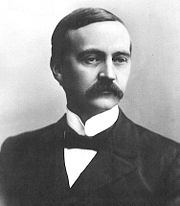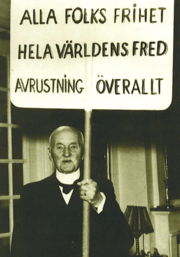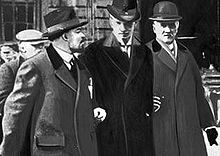
Carl Lindhagen
Encyclopedia

Sweden
Sweden , officially the Kingdom of Sweden , is a Nordic country on the Scandinavian Peninsula in Northern Europe. Sweden borders with Norway and Finland and is connected to Denmark by a bridge-tunnel across the Öresund....
lawyer, socialist politician, and pacifist.
Carl Lindhagen was the Chief Magistrate (Borgmästare
Burgomaster
Burgomaster is the English form of various terms in or derived from Germanic languages for the chief magistrate or chairman of the executive council of a sub-national level of administration...
) of Stockholm
Stockholm
Stockholm is the capital and the largest city of Sweden and constitutes the most populated urban area in Scandinavia. Stockholm is the most populous city in Sweden, with a population of 851,155 in the municipality , 1.37 million in the urban area , and around 2.1 million in the metropolitan area...
1903 – 1930. His office was more senior than mayor, as it was an unelected gubernatorial and judicial office under the Swedish government, and not the Municipality of Stockholm.
As a lawyer, Lindhagen participated as adviser for the executives of the testament of Alfred Nobel
Alfred Nobel
Alfred Bernhard Nobel was a Swedish chemist, engineer, innovator, and armaments manufacturer. He is the inventor of dynamite. Nobel also owned Bofors, which he had redirected from its previous role as primarily an iron and steel producer to a major manufacturer of cannon and other armaments...
. He was the secretary of the Nobel Committee
Nobel Prize
The Nobel Prizes are annual international awards bestowed by Scandinavian committees in recognition of cultural and scientific advances. The will of the Swedish chemist Alfred Nobel, the inventor of dynamite, established the prizes in 1895...
in 1899. And at times he was suggested as a nominee to receive the Nobel Peace Prize
Nobel Peace Prize
The Nobel Peace Prize is one of the five Nobel Prizes bequeathed by the Swedish industrialist and inventor Alfred Nobel.-Background:According to Nobel's will, the Peace Prize shall be awarded to the person who...
, for his anti-militarism commitments.
Lindhagen fought for democracy, women's rights and better conditions for the working class and working farmers. He was also an advocate for better conditions for the indigenous sami people
Sami people
The Sami people, also spelled Sámi, or Saami, are the arctic indigenous people inhabiting Sápmi, which today encompasses parts of far northern Sweden, Norway, Finland, the Kola Peninsula of Russia, and the border area between south and middle Sweden and Norway. The Sámi are Europe’s northernmost...
in northern Scandinavia
Scandinavia
Scandinavia is a cultural, historical and ethno-linguistic region in northern Europe that includes the three kingdoms of Denmark, Norway and Sweden, characterized by their common ethno-cultural heritage and language. Modern Norway and Sweden proper are situated on the Scandinavian Peninsula,...
.
He married the first time in 1883 and his wife died after long sickness in 1902. He remarried in 1904 and had two children with his new wife, Jenny Lindhagen.
Born in Stockholm, Carl Lindhagen studied law in Uppsala
Uppsala
- Economy :Today Uppsala is well established in medical research and recognized for its leading position in biotechnology.*Abbott Medical Optics *GE Healthcare*Pfizer *Phadia, an offshoot of Pharmacia*Fresenius*Q-Med...
. He started his political career in the Liberal party, which in the time before democracy was considered a radical movement. He joined the Swedish Social Democratic Party
Swedish Social Democratic Party
The Swedish Social Democratic Workers' Party, , contesting elections as 'the Workers' Party – the Social Democrats' , or sometimes referred to just as 'the Social Democrats' and most commonly as Sossarna ; is the oldest and largest political party in Sweden. The party was founded in 1889...
in 1909, when he was already almost 50 years old. He soon joined the leftist opposition against the party leader Hjalmar Branting
Hjalmar Branting
was a Swedish politician. He was the leader of the Swedish Social Democratic Party , and Prime Minister during three separate periods . When Branting came to power in 1920, he was the first Social Democratic Prime Minister of Sweden...
. The left-wing was headed by the young Communist Zeth Höglund
Zeth Höglund
Carl Zeth "Zäta" Konstantin Höglund was a leading Swedish communist politician, anti-militarist, author, journalist and mayor of Stockholm ....
, and in 1917 the group broke away from the mother party and formed the Social Democratic Left Party of Sweden (SSV).

Ture Nerman
Ture Nerman was a Swedish socialist. As a journalist and author, he was a well-known political activist in his time. He also wrote poems and songs.Nerman was a vegetarian and a strict teetotaler...
and Fredrik Ström
Fredrik Ström
Fredrik Ström was a Swedish Socialist politician and a prolific writer. He held a seat in the Riksdag from 1916 - 1921, and from 1930 - 1938....
, was part of a small delegation that greeted Lenin during his short visit in Stockholm in April 1917. The Swedish Communists took Lenin to the PUB
PUB (Stockholm)
PUB is one of the major department stores in Stockholm, Sweden, located in two buildings at Hötorget, Stockholm city center. PUB was opened in 1882 and rapidly expanded...
department store where they bought him a brand new suit so he would look good and clean coming back home to revolutionary Petrograd.

Bolshevik
The Bolsheviks, originally also Bolshevists , derived from bol'shinstvo, "majority") were a faction of the Marxist Russian Social Democratic Labour Party which split apart from the Menshevik faction at the Second Party Congress in 1903....
revolution in Russia
Russia
Russia or , officially known as both Russia and the Russian Federation , is a country in northern Eurasia. It is a federal semi-presidential republic, comprising 83 federal subjects...
, but he was also a pacifist and disagreed with some aspects of Communism. In 1921, he opposed the adoption of the Twenty-one Conditions
Twenty-one Conditions
The Twenty-one Conditions, officially the Conditions of Admission to the Communist International, refer to the conditions given by Vladimir Lenin to the adhesion of the socialists to the Third International created in 1919 after the 1917 October Revolution. The conditions were formally adopted by...
of the ComIntern
Comintern
The Communist International, abbreviated as Comintern, also known as the Third International, was an international communist organization initiated in Moscow during March 1919...
, and was thus expelled from SSV. He and fellow expellees formed a rump SSV
Social Democratic Left Party of Sweden (1921)
Social Democratic Left Party of Sweden was a political party formed in 1921, after a split from the main SSV.When the original SSV approved the 21 thesis of the Communist International and thus changing name to SKP in 1921, an anti-ComIntern minority were expelled and founded their own "SSV"....
. In 1923 he, along with the rest of his party, rejoined the Social Democratic Party.
Lindhagen and Esperanto
Lindhagen was a longtime supporter of the international language EsperantoEsperanto
is the most widely spoken constructed international auxiliary language. Its name derives from Doktoro Esperanto , the pseudonym under which L. L. Zamenhof published the first book detailing Esperanto, the Unua Libro, in 1887...
. From 1911, he addressed the Swedish parliament almost every year about the idea of an international language. In 1928 he clearly proposed Esperanto. As a result, in 1929, 1930 and 1931 the Swedish parliament voted a sum of 2900 kronas for instructional Esperanto courses. He also participated in presenting the Esperanto course of Andreo Cseh for Swedish parliamentarians.
He gave the opening speech during the 1927 World Congress of Esperanto
World Congress of Esperanto
The World Congress of Esperanto has the longest tradition among international Esperanto conventions, with an almost unbroken run of more than a hundred years. The congresses have been held since 1905 every year, except during World Wars I and II...
in Danzig, and also spoke during an instructional session during the 1934 Congress.

